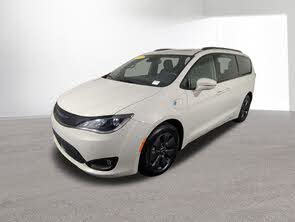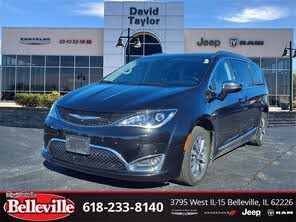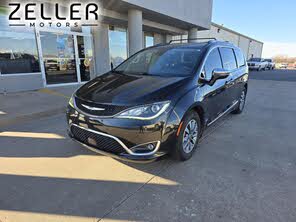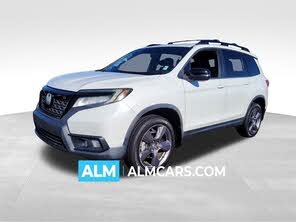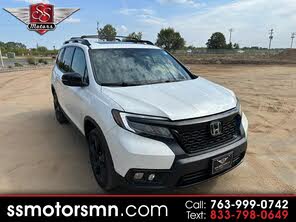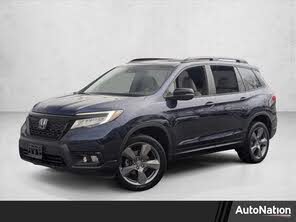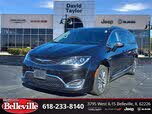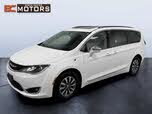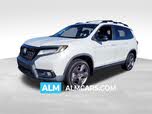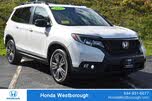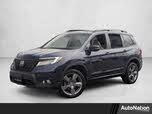2020 Chrysler Pacifica Hybrid vs 2021 Honda Passport
Overview | |
MSRP$39,995 | MSRP$32,790 |
Listings62 | Listings459 |
Ratings & Reviews | |
User Reviews | User Reviews |
Expert reviews | Expert reviews8.0 out of 10 |
Pros
Cons
| |
2020 Chrysler Pacifica Hybrid Reviews Summary | |
2021 Honda Passport Reviews SummaryThe 2021 Honda Passport was introduced for the 2019 model year. It carries over to 2021 largely unchanged, but with some additional features. First used by Honda in the early 1990s, the Passport name harkens back to a time when SUVs were more about rugged off-road capability. SUVs are very different beasts these days, and the Passport bridges the gap as an adventurous crossover SUV that is designed with daily life in mind. The Passport is closely related to the Honda Pilot. The fact that Honda offers multiple midsize SUVs might seem confusing. Automakers always talk about not wanting one model to cannibalize sales of another. Though the Honda Passport and the Honda Pilot are in the same category, the Passport stands out as a more active alternative. It leverages that older more rugged Honda nameplate and backs it up with some features not found on the family-hauling Pilot. | |
No video found | No video found |
Popular Features & Specs | |
Engine3.6L 260 hp V6 Hybrid | Engine3.5L 280 hp V6 |
Drive TrainFWD | Drive TrainFWD |
Seating Capacity7 | Seating Capacity5 |
Horsepower | Horsepower280 hp @ 6000 rpm |
EV Battery Capacity16 kWh | EV Battery Capacity |
MPG City29 | MPG City20 |
MPG Highway30 | MPG Highway25 |
Battery Charge Time (240V)2 hours | Battery Charge Time (240V) |
Engine | |
Engine Name3.6L 260 hp V6 Hybrid | Engine Name3.5L 280 hp V6 |
Torque | Torque262 lb-ft @ 4700 rpm |
Horsepower | Horsepower280 hp @ 6000 rpm |
Battery Charge Time (240V)2 hours | Battery Charge Time (240V) |
DrivetrainFWD | DrivetrainFWD |
Fuel Economy | |
EV Battery Capacity16 kWh | EV Battery Capacity |
MPG City29 | MPG City20 |
MPG Highway30 | MPG Highway25 |
Interior | |
Seating Capacity7 | Seating Capacity5 |
Safety | |
Front Crash Overall4 | Front Crash Overall4 |
Side Crash Overall5 | Side Crash Overall5 |
Dimensions & Capacity | |
Cargo Space32.3 cu ft | Cargo Space41.2 cu ft |
Curb Weight4987 lbs | Curb Weight3959 lbs |
Height69.9 in | Height71.6 in |
Length204.3 in | Length190.5 in |
Width90.4 in | Width78.6 in |
Wheelbase121.6 in | Wheelbase111.0 in |
Maximum Payload1313 lbs | Maximum Payload1332 lbs |
Number of doors4 | Number of doors4 |
Maximum Towing Capacity | Maximum Towing Capacity3500 lbs |
Overview | ||
MSRP | $39,995 | $32,790 |
Listings | ||
Ratings & Reviews | ||
User reviews | ||
Expert reviews | 8.0 out of 10Read full review | |
Pros & cons | Pros
Cons
| |
Summary | The 2021 Honda Passport was introduced for the 2019 model year. It carries over to 2021 largely unchanged, but with some additional features. First used by Honda in the early 1990s, the Passport name harkens back to a time when SUVs were more about rugged off-road capability. SUVs are very different beasts these days, and the Passport bridges the gap as an adventurous crossover SUV that is designed with daily life in mind. The Passport is closely related to the Honda Pilot. The fact that Honda offers multiple midsize SUVs might seem confusing. Automakers always talk about not wanting one model to cannibalize sales of another. Though the Honda Passport and the Honda Pilot are in the same category, the Passport stands out as a more active alternative. It leverages that older more rugged Honda nameplate and backs it up with some features not found on the family-hauling Pilot. | |
Video | No video found | No video found |
Popular Features & Specs | ||
Engine | 3.6L 260 hp V6 Hybrid | 3.5L 280 hp V6 |
Drive Train | FWD | FWD |
Seating Capacity | 7 | 5 |
Horsepower | 280 hp @ 6000 rpm | |
EV Battery Capacity | 16 kWh | |
MPG City | 29 | 20 |
MPG Highway | 30 | 25 |
Battery Charge Time (240V) | 2 hours | |
Engine | ||
Engine Name | 3.6L 260 hp V6 Hybrid | 3.5L 280 hp V6 |
Torque | 262 lb-ft @ 4700 rpm | |
Horsepower | 280 hp @ 6000 rpm | |
Battery Charge Time (240V) | 2 hours | |
Drivetrain | FWD | FWD |
Fuel Economy | ||
EV Battery Capacity | 16 kWh | |
MPG City | 29 | 20 |
MPG Highway | 30 | 25 |
Interior | ||
Seating Capacity | 7 | 5 |
Safety | ||
Front Crash Overall | 4 | 4 |
Side Crash Overall | 5 | 5 |
Dimensions & Capacity | ||
Cargo Space | 32.3 cu ft | 41.2 cu ft |
Curb Weight | 4987 lbs | 3959 lbs |
Height | 69.9 in | 71.6 in |
Length | 204.3 in | 190.5 in |
Width | 90.4 in | 78.6 in |
Wheelbase | 121.6 in | 111.0 in |
Maximum Payload | 1313 lbs | 1332 lbs |
Number of doors | 4 | 4 |
Maximum Towing Capacity | 3500 lbs | |

By: CarGurus + AI
At CarGurus, our team of experienced automotive writers remain at the heart of our content operation, conducting hands-on car tests and writing insightful guides that are backed by years of industry experience. To complement this, we are harnessing AI to make our content offering more diverse and more helpful to shoppers than ever. To achieve this, our AI systems are based exclusively on CarGurus content, ratings and data, so that what we produce is both unique to CarGurus, and uniquely helpful to car shoppers.


